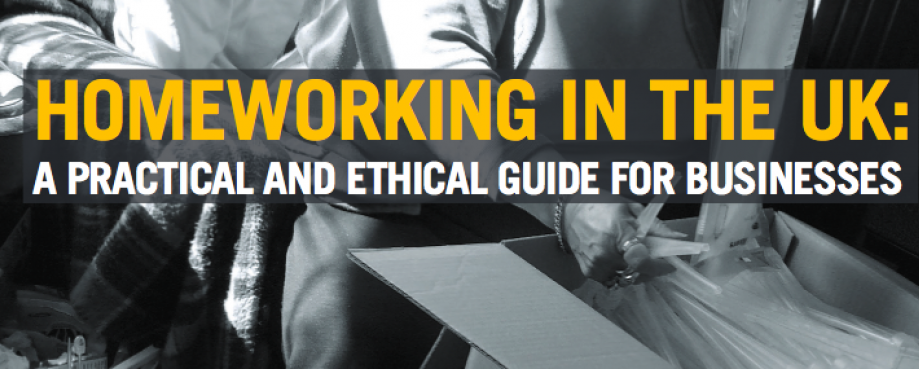
Homeworking in the UK: A practical and ethical guide for business
Are you up to speed with how UK legislation on minimum wage and holidays applies to homeworkers? Companies often need advice on how to apply the ETI Base Code, or the best approach to health and safety issues with UK homeworkers, according to Nesta Holden, from Homeworkers Worldwide. Beyond legal requirements there are practical approaches to communication and coordination that can improve the working lives of homeworkers, and the efficiency of businesses at the same time.
With this in mind, Homeworkers Worldwide (HWW) has produced a new guide, Homeworking in the UK: A practical and ethical guide for business.
Aimed at retailers who may have homeworkers in their supply chains, and companies who work directly with homeworkers here in the UK, it shows how a best practice approach to homeworking can help businesses, as well as providing practical guidance on UK employment law as it relates to homeworkers. Even companies unaware of homeworking in their UK chains will find the guide useful as it outlines the surprising range of jobs being done by homeworkers in the UK and gives useful pointers as to the many supply chains where homeworkers may be found.
It meant a lot to me when I found this work. The only thing that annoys me is that I don’t get treated like everyone else. Why should we be treated differently just because we work at home?
(Karen, a UK homeworker making cards for card shops and supermarkets)
Nesta feels that for too long, homeworkers were an invisible section of the workforce, despite the fact they play an integral part both in global supply chains and local economies.
"ETI's Homeworker Project, and the efforts of Homeworkers Worldwide and other NGOs, have raised awareness and understanding about homeworking, but there's still a long way to go," she says.
The ETI Homeworker Group’s achievements included building up a range of resources on homeworking issues, and encouraging member companies to adopt homeworking policies, and many leading companies now have homeworker policies which help them uncover and address the conditions of homeworkers in their supply chains.
Nesta is heartened to find that increasing numbers of companies are contacting them at Homeworkers Worldwide – seeking advice on adopting homeworker policies, or on addressing specific homeworking issues in their chains.
But there is still a lack of understanding of just how commonplace and widespread homeworking is, she says.
"It is not just skilled artisans producing handicrafts in exotic locations, plenty of homeworkers are engaged in the mass production of goods such as T-shirts, leggings, footwear and electricals. Here in the UK homeworkers are employed packing everything from soaps to screws, and in the production and assembly of many other products – yet this often goes unnoticed.
Many companies are unaware of homeworkers in their supply chains in the UK. Even retailers who do know about homeworkers in their UK chains, and suppliers who work directly with homeworkers, find there is lack of information and guidance surrounding this issue.
This new guide is particularly timely given the growing trend of manufacturing – in particular garment manufacturing – returning to the UK. In the past, homeworking was an integral part of the UK garment industry and at Homeworkers Worldwide, we are in no doubt that the growth of UK garment manufacture will inevitably also lead to a growth of homeworkers in that sector."
You can download Homeworking in the UK, here.
